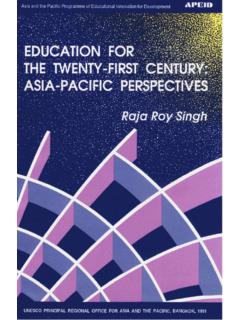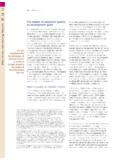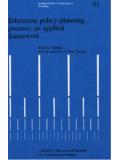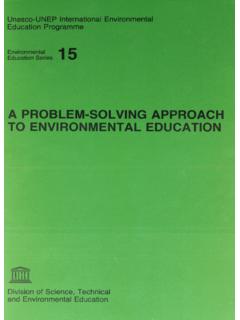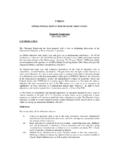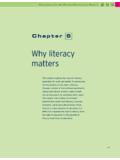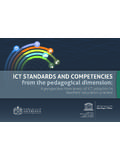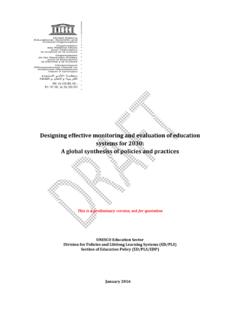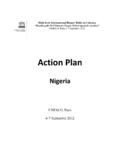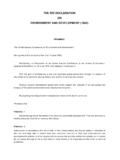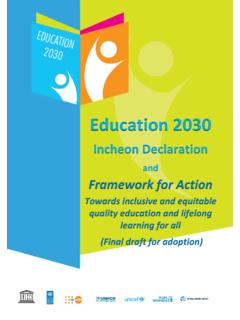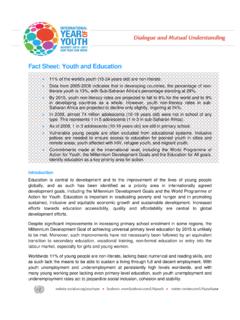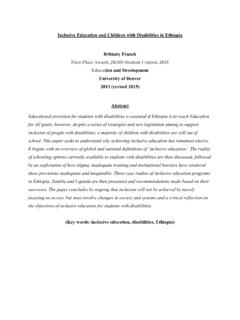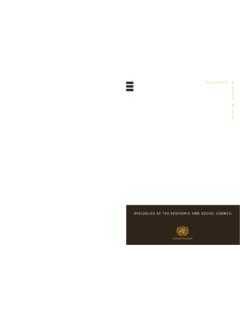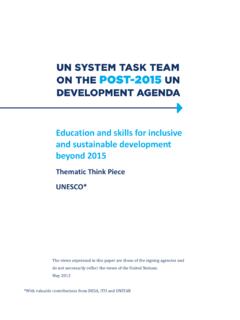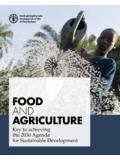Transcription of Understanding education quality - UNESCO | Building peace ...
1 Chapter1 Understandingeducation qualityThe goal of achieving universal primary education (UPE) has been on the international agenda since the Universal Declaration of Human Rights affirmed,in 1948, that elementary education was to be madefreely and compulsorily available for all children in all nations. This objective was restated subsequentlyon many occasions, by international treaties and in United Nations conference of these declarations and commitments are silentabout the quality of education to be provided. 275002 EFA Global Monitoring Report1. Such statements are foundin the declarations thatemerged from a series ofUnited Nations regionalconferences on education in the early 1960s, in thetreaties that formed theInternational Bill of HumanRights in the 1970s, in theWorld Declaration onEducation for All adopted at the World Conference onEducation for All in Jomtien,Thailand, 1990 and in theMillennium Declaration andthe Dakar Framework forAction in 2000 (for details see UNESCO , 2003a: 24-8).
2 The last two reaffirmed the commitment to achieveuniversal provision andaccess to primary schoolingand added a target This was most notably sowith the Convention on theRights of the Child, whichcame into force in This categorization of theways in which education isvaluable to individuals andsociety is informed by theclassification suggested byDr ze and Sen (2002: 38-40).Why focus on quality ?Although some of the international treaties, by specifying the need to provide education onhuman rights, reproductive health, sports andgender awareness, touched on educationalquality,2they were generally silent about howwell education systems could and should beexpected to perform in meeting these remained true as recently as 2000, when theUnited Nations Millennium Declaration scommitment to achieve UPE by 2015 was directlyand simply set out without explicit reference to quality (see Box ).
3 Thus, in placing theemphasis upon assuring access for all, theseinstruments mainly focused on the quantitativeaspects of education seems highly likely, however, that theachievement of universal participation ineducation will be fundamentally dependent uponthe quality of education available. For example,how well pupils are taught and how much theylearn, can have a crucial impact on how long they stay in school and how regularly they , whether parents send theirchildren to school at all is likely to depend onjudgements they make about the quality ofteaching and learning provided upon whetherattending school is worth the time and cost fortheir children and for themselves. Theinstrumental roles of schooling helpingindividuals achieve their own economic andsocial and cultural objectives and helping societyto be better protected, better served by its leaders and more equitable in important ways will be strengthened if education is of helps children developcreatively and emotionally and acquire the skills,knowledge, values and attitudes necessary forresponsible, active and productive well education achieves these outcomes is important to those who use it.
4 Accordingly,analysts and policy makers alike should also find the issue of quality difficult to fundamentally, education is a set ofprocesses and outcomes that are definedqualitatively. The quantityof children whoparticipate is by definition a secondaryconsideration: merely filling spaces called schools with children would not address even5002 EFA Global Monitoring Report28/ CHAPTER 1 The achievement of universalparticipation ineducation will befundamentallydependent uponthe quality ofeducationavailableEFA Dakar goals1. Expanding and improving comprehensive earlychildhood care and education , especially for themost vulnerable and disadvantaged Ensuring that by 2015 all children, particularlygirls, children in difficult circumstances and thosebelonging to ethnic minorities have access tocomplete free and compulsory primary educationof good Ensuring that the learning needs of all youngpeople and adults are met through equitable accessto appropriate learning and life achieving a 50 per cent improvement in levels of adult literacyby 2015, especially for women, and equitable access to basic and continuingeducation for all Eliminating gender disparities in primary andsecondary education by 2005 and achieving genderequalityin education by 2015, with a focus onensuring girls full and equal access to (andachievement in)
5 Basic education of good Improving all aspects of the quality of educationand ensuring excellence of all so that recognizedand measurable learning outcomes are achieved by all, especially in literacy, numeracy and essentiallife Development GoalsGoal 2. Achieve universal primary educationTarget 3. Ensure that by 2015 children everywhere,boys and girls alike, will be able to complete a fullcourse of primary 3. Promote gender equality and empowerwomenTarget 4. Eliminate gender disparity in primary andsecondary education , preferably by 2005, and at alllevels of education no later than Dakar Framework for Action and Millennium Development Goals4. Adams (1993) identifies aboutfifty different definitions of objectives if no real educationoccurred. Thus, the number of years of school is a practically useful but conceptually dubiousproxy for the processes that take place there and the outcomes that result.
6 In that sense, itcould be judged unfortunate that the quantitativeaspects of education have become the mainfocus of attention in recent years for policymakers (and many quantitatively inclined socialscientists).It should come as no surprise, therefore, that the two most recent United Nations internationalconference declarations focusing on educationgave some importance to its qualitativedimension (Box ). The Jomtien Declaration in 1990 and, more particularly, the DakarFramework for Action in 2000 recognized thequality of education as a prime determinant ofwhether education for All is achieved. Morespecifically than earlier pledges, the second ofthe six goals set out in the Dakar Frameworkcommits nations to the provision of primaryeducation of good quality (Box ). Moreover,the sixth goal includes commitments to improveall aspects of education quality so that everyonecan achieve better learning outcomes, especiallyin literacy, numeracy and essential life skills.
7 Notwithstanding the growing consensus aboutthe need to provide access to education of goodquality , there is much less agreement aboutwhat the term actually means in summarizes the evolution of UNESCO sunderstanding of education quality . This effort indefinition goes beyond the intrinsic andinstrumental goals of education mentionedearlier. It seeks to identify unambiguously theimportant attributes or qualities of education that can best ensure that those goals are actuallymet. Similar formulations can be found indocuments produced by other internationalorganizations and in the vast array of literaturedealing with the content and practice ofeducation. Although the details differ, two keyelements characterize such approaches:First, cognitive development is identified as a major explicit objective of all educationsystems. The degree to which systems actuallyachieve this is one indicator of their quality .
8 While this indicator can be measured relativelyeasily at least within individual societies, if notthrough international comparison it is muchmore difficult to determine how to improve theresults. Thus, if quality is defined in terms ofcognitive achievement, ways of securingincreased quality are neither straightforward nor second element is education s role inencouraging learners creative and emotionaldevelopment, in supporting objectives of peace ,citizenship and security, in promoting equalityand in passing global and local cultural valuesdown to future generations. Many of theseobjectives are defined and approached in diverseways around the world. Compared with cognitivedevelopment, the extent to which they areachieved is harder to education quality /29It could be judgedunfortunate that thequantitative aspectsof education havebecome the mainfocus of attention in recent years forpolicy makersIn 1990, the World Declaration on education for Allnoted that the generally poor quality of educationneeded to be improved and recommended thateducation be made both universally available andmore relevant.
9 The Declaration also identifiedquality as a prerequisite for achieving thefundamental goal of equity. While the notion ofquality was not fully developed, it was recognizedthat expanding access alone would be insufficientfor education to contribute fully to the developmentof the individual and society. Emphasis wasaccordingly placed on assuring an increase inchildren s cognitive development by improving the quality of their decade later, the Dakar Framework for Actiondeclared that access to quality education was theright of every child. It affirmed that quality was atthe heart of education a fundamental determinantof enrolment, retention and achievement. Itsexpanded definition of quality set out the desirablecharacteristics of learners (healthy, motivatedstudents), processes (competent teachers usingactive pedagogies), content (relevant curricula) andsystems (good governance and equitable resourceallocation).
10 Although this established an agenda forachieving good education quality , it did not ascribeany relative weighting to the various quality as defined in Jomtien and DakarQuality for whom and what?Rights, equity and relevanceAlthough opinions about quality in education areby no means unified, at the level of internationaldebate and action three principles tend to bebroadly shared. They can be summarized as theneed for more relevance, for greater equity ofaccess and outcome and for proper observanceof individual rights. In much current internationalthinking, these principles guide and informeducational content and processes and representmore general social goals to which educationitself should these, the question of rightsis at the , as indicated earlier, most humanrights legislation focuses upon access toeducation and is comparatively silent about itsquality, the Convention on the Rights of the Childis an important exception.
